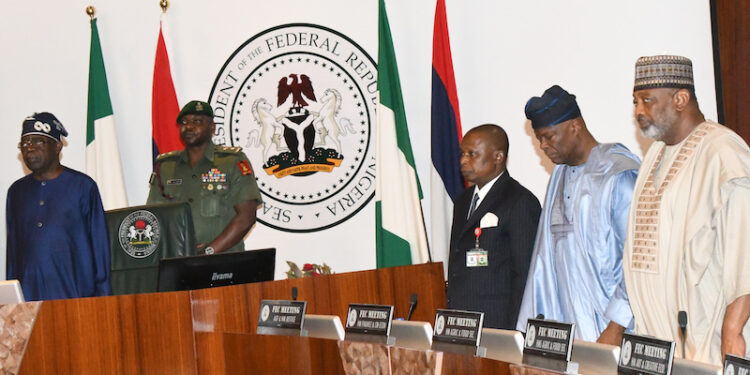The Federal Executive Council, presided over by President Bola Tinubu, unveiled 21 significant policy initiatives after a marathon meeting on Tuesday. Mr. Bayo Onanuga, the President’s Adviser on Media and Publicity, shared the initiatives on his X handle, formerly known as Twitter. These initiatives include implementing a 48-hour visa policy, abolishing airport toll exemptions for very important persons, and imposing a ban on sand dredging within 10 kilometers of all federal bridges nationwide.
The meeting, which commenced on Monday and concluded on Tuesday, marked an unprecedented session in the council’s history. Following thorough discussions, the council approved several policies and projects aimed at bolstering the economy, fostering investments, and enhancing the ease of doing business in the country.
Speaking to State House correspondents after the FEC meeting at Aso Rock Villa in Abuja, Minister of Information and National Orientation, Mohammed Idris, disclosed that the Federal Government is reassessing its visa regime to facilitate a 48-hour visa issuance process for individuals intending to invest in Nigeria. This move is intended to encourage investors and tourists alike and streamline the process of doing business in Nigeria.
Since assuming office in May 2023, the Bola Tinubu administration has actively pursued foreign investment opportunities through strategic international engagements and high-level meetings aimed at boosting Nigeria’s economic profile.
Addressing journalists after the FEC meeting, the information minister revealed that a tripartite committee had been established to review the visa issuance process. The committee’s mandate is to streamline the visa application process, making it more efficient and accessible to investors and tourists.
The implementation of an e-visa platform is part of Nigeria’s broader effort to modernize its visa system, as outlined in the Nigeria Visa Policy (NVP) 2020. The e-visa system allows non-Nigerian visitors to apply online, though challenges such as documentation requirements and occasional technical glitches persist. However, the government is committed to enhancing the system’s efficiency to attract more visitors and investors to the country.
In addition to visa reforms, the Federal Government announced plans to generate at least N10 billion annually from airport access tolls. Minister of Aviation and Aerospace Development, Mr. Festus Keyamo, disclosed this while briefing State House correspondents after the FEC meeting. The government aims to stop revenue losses resulting from toll exemptions for VIPs and government officials, thereby ensuring proper maintenance of airport facilities and quality services for users.
Furthermore, the FEC approved several other initiatives, including a N2 trillion mortgage initiative, a ban on sand dredging near federal bridges, and the construction of a N51 billion transport terminal hub in Abuja. Additionally, $7 million worth of US property will be designated as Nigeria’s tech hub.
The government also approved a new revenue platform for gaming and lottery businesses, along with a N546 billion budget for road projects in Lagos, Kwara, Edo, Kebbi, and Sokoto states.
Moreover, the FEC sanctioned about N72 billion for the construction of a new transmission line and emergency restoration systems for other transmission lines to enable quick repair of vandalized power infrastructure. These measures aim to enhance the reliability and stability of Nigeria’s power supply.
The Federal Government urged organized labor not to derail its transformation plan for the power sector, assuring that their grievances would be considered. The government emphasized its commitment to achieving a sustainable and affordable electricity supply in Nigeria through ongoing reforms.
Furthermore, the government revealed plans to tap into local funds, such as pension and life insurance, to develop infrastructure in the country. Minister of Finance and Coordinating Minister for the Economy, Wale Edun, highlighted the availability of over N20 trillion in such funds, which will be channeled into infrastructure projects and housing development.
In conclusion, the FEC’s latest decisions underscore the government’s commitment to implementing policies and projects that promote economic growth, attract investments, and improve infrastructure across various sectors in Nigeria.
























